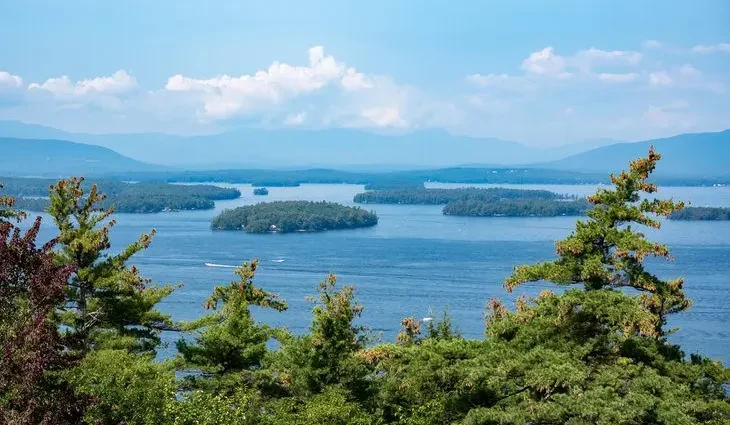Contents
New Hampshire can thank the glaciers for the abundance of lakes that spread across the landscape, left as the ice receded and melted more than 15,000 years ago. The state officially lists 944 lakes, 17 of them larger than 1,000 acres. The largest of all, Lake Winnipesaukee, covers more than 44,000 acres.
In choosing the best lakes to include, considerations such as access, aesthetics, and activities were more important than size. NH has several larger lakes, including Ossipee Lake and Massabesic, which are not on this list. Some are lined by private cottages and have no public access or beaches; others are public water supplies that do not permit swimming, or otherwise limit public use.
The lakes chosen are those that tourists and locals looking for water sports and outdoor recreation would enjoy. Whether you are looking for places to fish, canoe, kayak, sail, waterski, swim, take a scenic cruise, rent a lakeside cottage, or have a picnic overlooking the water, New Hampshire has just the right lake for you.
These lakes aren’t just for summer; most are four-season playgrounds, too. Autumn foliage is twice as beautiful when its colors are mirrored in the water; spring, before the waters warm, is the best time of the year to fish for lake trout and landlocked salmon.
Ice fishing is a popular winter sport here, and Meredith, on Lake Winnipesaukee, hosts a pond hockey tournament each year. The frozen lakes serve as venues for dogsledding, snowmobiling, ice sailing, even auto racing. At Alton Bay, also on Winnipesaukee, you can watch planes land at the last FAA-certified ice runway in the continental United States.
You’ll find plenty of things to do in any season with this list of the best lakes in New Hampshire.
1. Lake Winnipesaukee
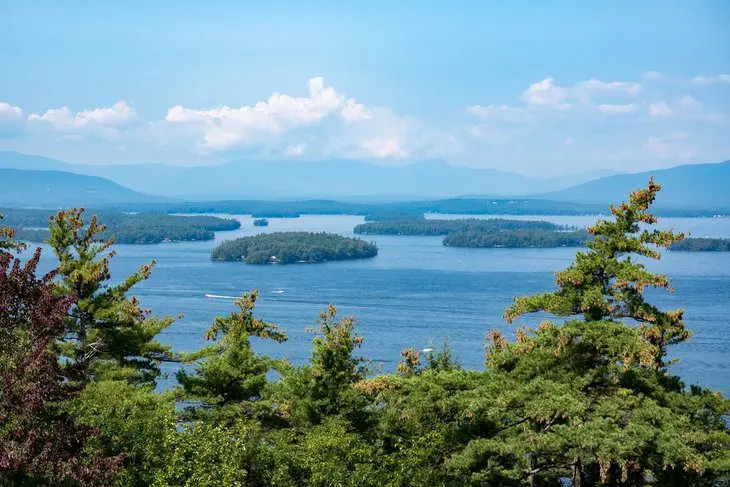
New Hampshire’s largest lake and the poster child for the state’s entire central region, Winnipesaukee is a summer playground beloved by families for its beaches, water sports, and kid-friendly attractions.
The area around Weirs Beach, in the western shore, is the most developed, with a 450-foot lifeguarded sand beach at Endicott Rock Park, where there are changing facilities, a playground, and shaded picnic tables. The small boat launch here is a good way for canoes and kayak to access the lake.
FunSpot is a huge arcade with the world’s largest video game museum, and at the boardwalk, you can board the M/S Mount Washington or the US Mailboat M/V Sophie C. for a sightseeing cruise around the lake.
South of Weirs Beach, in Gilford, Ellacoya State Park has a 600-foot sand beach and a campground for RVs only, with no tent sites.
Just north of Weirs Beach is quieter Meredith, with a cluster of upscale hotels and restaurants overlooking the lake. Its smart shops and the League of NH Craftsmen gallery are good places to go shopping. On the eastern shore of the lake, Wolfeboro has fewer traditional family attractions, but more places to swim.
Brewster Beach and the smaller Carry Beach (its shallow water is great for smaller children) are close together on Lake Winnipesaukee, and both have lifeguards in the summer. Places to launch canoes and kayaks are plentiful, and you can rent them in Wolfeboro.
2. Squam Lake
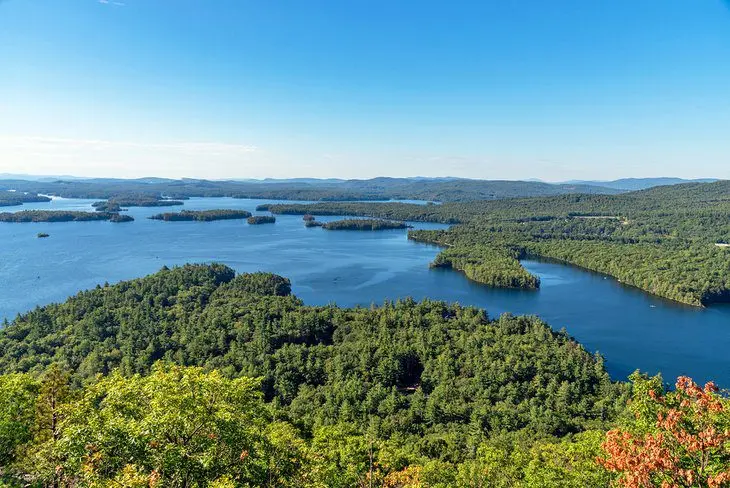
After the busy holiday scene around lake Winnipesaukee, the short drive to Squam Lake takes you to a world apart. Only one town, tiny Holderness, sits on its irregular shore and its cottages are tucked discreetly behind the trees. On a quiet paddle about the lake, you could easily think that large stretches of its shore are uninhabited except for loons and the occasional eagle.
Learn more about these and the lake environments on a naturalist cruise operated by the Squam Lakes Natural Science Center. You can meet local wildlife at the center’s protected preserve and hike its trails to the 1,067-foot summit of Mt. Fayal for views. Another trail leads from the center into beautiful Kirkwood Gardens, where flowering plants have been chosen to attract butterflies and birds.
Nearby, off Route 113, an old bridal path leads up West Rattlesnake Mountain to ledges overlooking the lake and Rattlesnake Island. With so many things to do between the two lakes, you’ll be looking for a place to stay nearby. Named for the movie starring Katherine Hepburn that was filmed on Squam Lake, The Manor on Golden Pond is set above the shore in a gracious old summer estate. Balconies from the sumptuous rooms overlook the lake.
3. Lake Sunapee
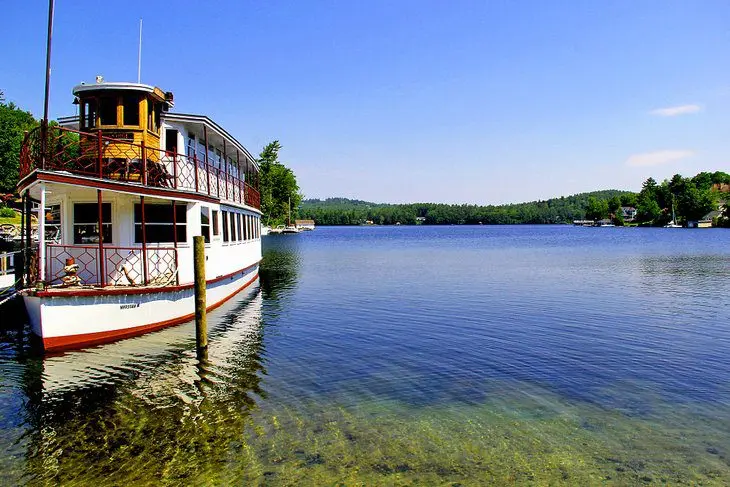
In western New Hampshire, Lake Sunapee sits under the 2,743-foot Mt. Sunapee, known for its downhill ski resort, which lies inside a state park. The park also includes a long white-sand beach on the lake, with lifeguards, a bathhouse, picnic tables, a boat launch, and both canoe and kayak rentals. About a mile from the beach is the park’s campground.
Lake Sunapee enjoyed early notice as a summer getaway spot for wealthy city families escaping the summer heat. They built elegant cottages on spacious lots along the wooded shores or stayed in resort hotels. You can still see a few remaining “cottages” on a tour of the lake on board the MV Mt. Sunapee II.
Along with splendid views of the mountain and shore, you’ll see a lighthouse, one of only two on New England lakes. To watch the sun set across the lake as you enjoy dinner, book a dinner cruise on the MV Kearsarge, a replica Victorian-era steamboat.
Garden lovers should stop at the southern end of the lake to visit The Fells, the 1890s estate of the Hay family. The stately summer mansion is surrounded by grounds that include a perennial border, a Japanese rock garden, and three formal walled gardens.
Official address: 86 Beach Access Road, Newbury, New Hampshire
Official site: https://www.nhstateparks.org
4. Newfound Lake
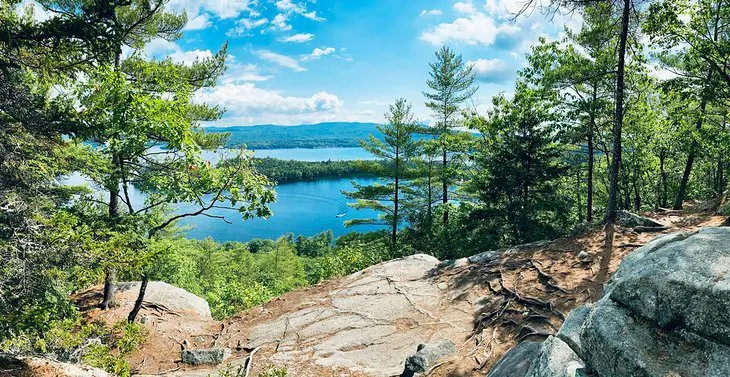
Newfound Lake, as deep as 183 feet at one point, is one of the deepest lakes in New Hampshire, and one of the cleanest anywhere. Its pristine waters are fed by eight springs, and its 22-mile shoreline is largely undeveloped.
Wellington State Park sits on the southern shore, with the state’s largest freshwater beach, a stretch of golden sand that’s partially shaded by tall pine trees that frame lake views. The park has a bathhouse with hot showers and restrooms, and lifeguards are on duty throughout the summer. You can bring picnic grills, and there is a small snack bar. Along with a free public boat launch, boat lanes allow visitors to arrive at the park by boat to use the beach.
Learn more about the lake and its watershed at events sponsored by the Newfound Lake Regional Association, such as paddling tours with ecologists. On the northern shore of the lake, the Newfound Audubon Center has interactive exhibits and trails through the lakeside woods and along the shore, where they also rent kayaks and canoes.
Address: 614 West Shore Road, Bristol, New Hampshire
5. Lake Umbagog
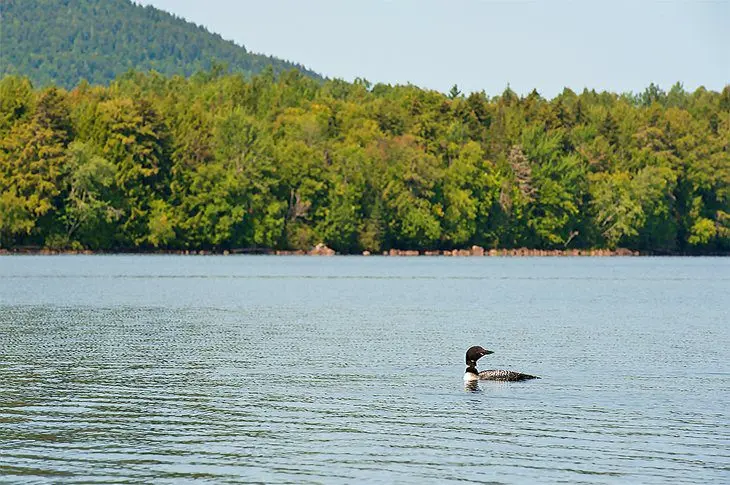
North of the White Mountains and with several corners extending over the border into Maine, Lake Umbagog is known as a paradise for paddle sport enthusiasts and one of New England’s top places to kayak. It’s one of the few places where you can paddle a canoe or kayak to a campsite. Umbagog State Park has 33 such remote sites along its irregular shores. Far from other campers, the only sounds at night are the cries of loons fishing on the lake.
Covering more than 7,500 acres, the lake is almost entirely undeveloped except for the park campground at its southern shore. You can rent canoes, kayaks, and rowboats there, and the park can provide transportation to the remote sites.
Much of the lake borders wildlife preserves, so it’s not surprising that wildlife spotting is common. You will almost certainly see loons and a number of other birds, and you might see moose, deer, and eagles.
Address: 235 East Route 26, Cambridge, New Hampshire
Official site: https://www.nhstateparks.org
6. Pawtuckaway Lake
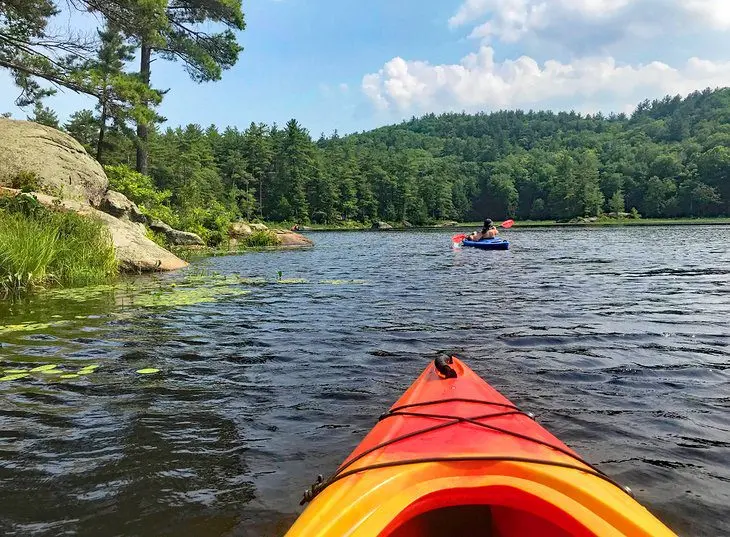
Hundreds of lakes and ponds are not the only relics of the glaciers that once covered the state. Like the lakes, giant boulders called glacial erratics, dropped as the ice receded, can be found throughout New Hampshire; one of the most impressive boulder fields is in the state park beside Pawtuckaway Lake.
At the park’s large sand beach, you can rent double and single kayaks, canoes, and paddleboards to tour the lake. Its tree-rimmed western shore is undeveloped, protected by the park, and has multiple coves to explore as you paddle. On land, you can climb to a fire tower, hike a loop trail to see the boulders, or look for beavers and herons in the marsh.
Many of the well-separated campsites overlook the lake, and the park also has cabins sleeping up to six people.
Address: 40 Pawtuckaway Road, Nottingham, New Hampshire
7. Echo Lake, North Conway
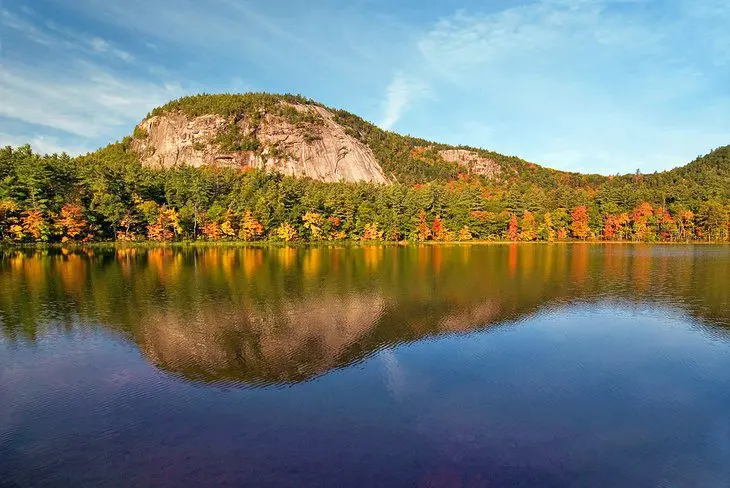
Not to be confused with the equally lovely Echo Lake at the head of Franconia Notch, North Conway’s Echo Lake is only a bit over 17 acres in size, but it is one of the state’s most beautiful. Located inside Echo Lake State Park, it is surrounded by forest, while overhead is the granite face of White Horse Ledge.
Just to the north is Cathedral Ledge; both are popular rock-climbing sites, and you can often see climbers slowly making their way up the cliff. North Conway is home of the International Mountain Climbing School, so if the sport looks tempting, lessons are readily available.
The public beach at the eastern side of the lake is sandy and has a shallow entry, ideal for small children and for putting in a kayak. Because of its orientation, the beach gets sun even into the late afternoon. Plentiful picnic tables are shaded by the trees, and there is a bathhouse with changing rooms. A scenic trail circles the lake, and several more ambitious hiking trails begin there.
Close to Echo Lake, the White Mountain Hotel and Resort is a luxurious 21st-century version of the grand hotels that once brought wealthy city families to the region, but with up-to-date facilities and freshly redecorated guest rooms.
Address: 68 Echo Lake Road, North Conway, New Hampshire
Official site: https://www.nhstateparks.org/visit/state-parks/echo-lakes-state-park
8. White Lake
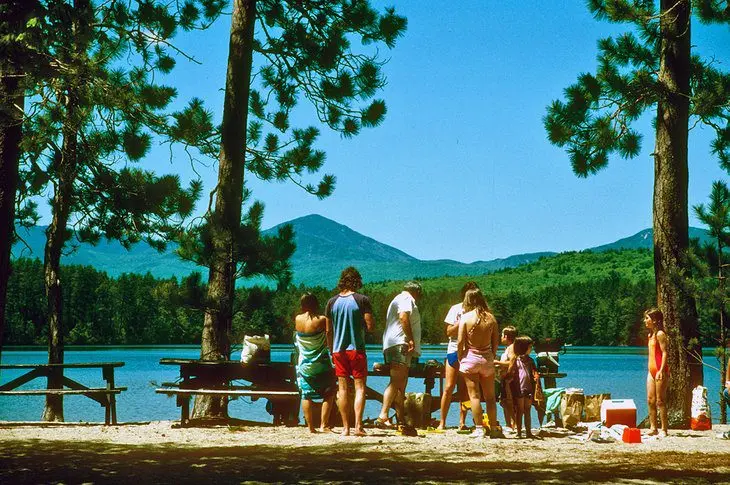
Although the 125-acre White Lake isn’t even close to being one of the state’s largest, it is one of the most popular, and has the only beachside campground in the White Mountains. Many of its 203 campsites are within sight of the lake, all shaded under tall pine trees, as are the tables in the day-use picnic area.
The long sandy shore has one of the finest views from any beach in the state, with the iconic pointed summit of Mt. Chocorua standing above the trees on the opposite shore. A woodland trail circles the lake, passing kettle bogs and signs of beaver activity.
Canoes, kayaks, and paddleboards are rented by the hour, and the lake is popular for fishing as well. A 72-acre stand of rare pitch pine trees, also in White Lake State Park, has been named a National Natural Landmark.
Address: 94 State Park Road, Tamworth, New Hampshire
Official site: https://www.nhstateparks.org/visit/state-parks/white-lake-state-park.aspx
9. Silver Lake
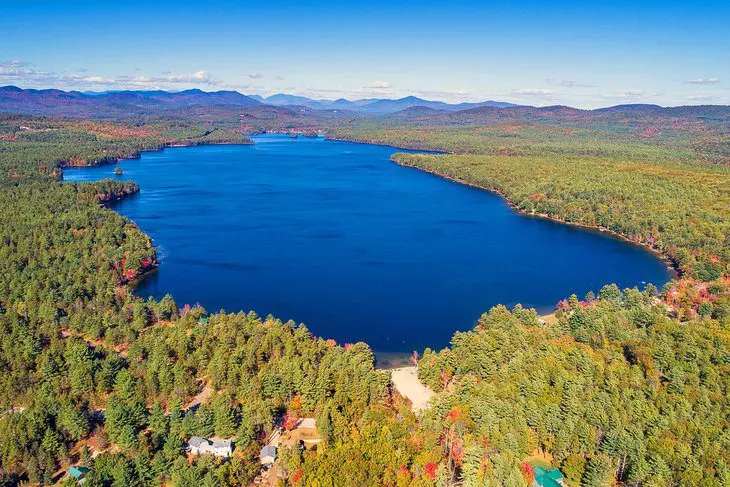
South of North Conway and the White Mountain National Forest, Silver Lake is a local secret, its three public beaches found by few tourists. Nichols Beach, Monument Beach, and Kennett Beach are for swimming, all open to the public and with the crystal-clear water for swimming and snorkeling.
Sailboats, canoes, and kayaks are a common sight, and you can rent kayaks or paddleboards; Jet Skis are not permitted. The boat ramp is at the south end of the lake. The fishing is excellent, with smallmouth bass, pickerel, lake trout, rainbow trout, and whitefish.
You can tour along the lakeshore and into the adjacent nature reserve in the open cars of the Silver Lake Railroad, which departs from the historic depot in the village of Silver Lake.
10. Lake Francis
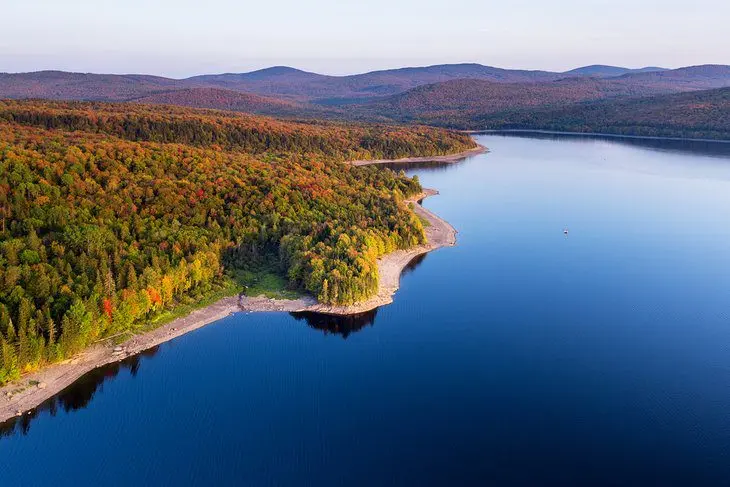
The far northern tip of New Hampshire, a region known as the Great North Woods, is sparsely settled, mostly close to the single road that continues to the Canadian border. To either side of Route 3, vast areas of forest are accessible only by logging roads and trails used by ATV riders in the summer and fall, and snowmobilers in the winter. Just short of 2,000 acres in size, Lake Francis is the southernmost of the large lakes that lie in the middle of this wilderness.
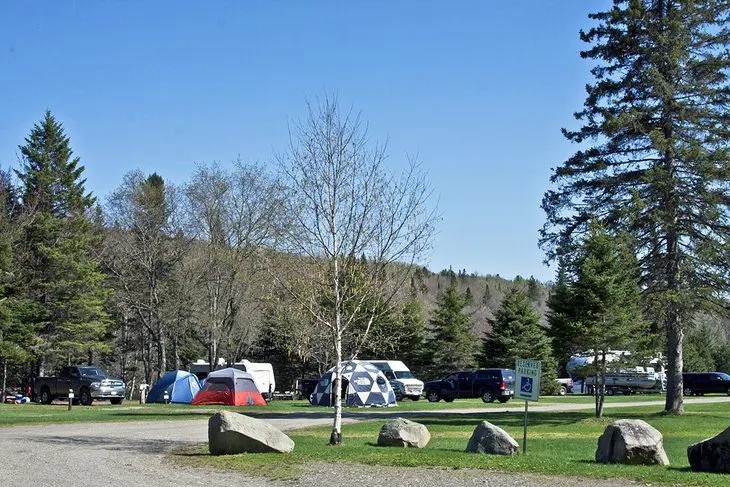
Lake Francis State Park is a popular access point for fishing, canoeing, and kayaking, and for those who hope to catch sight of the moose that often wade in its waters. Nine of the 45 campsites that lie alongside the lake are designed for ATV camping, and from these, ATV riders can access 1,000 miles of off-highway trails.
Lake Francis is connected to the Connecticut Lakes, farther north, by the Connecticut Rover.
Address: 439 River Road, Pittsburg, New Hampshire
Official site: https://www.nhstateparks.org/visit/state-parks/lake-francis-state-park.aspx
11. Lake Wentworth
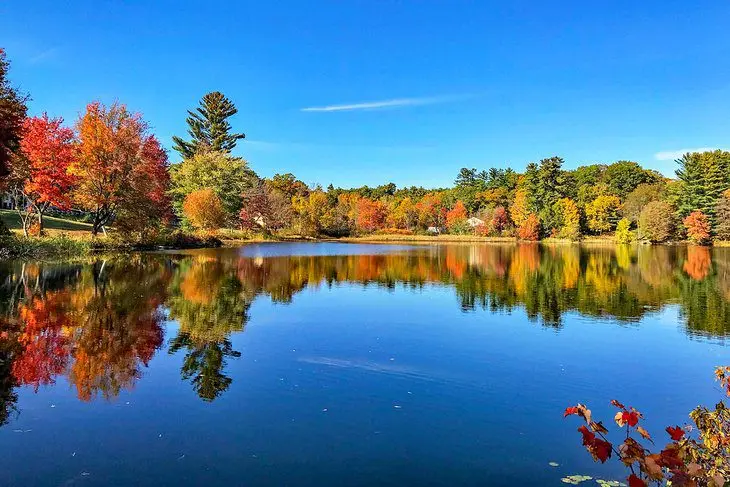
Almost overshadowed by its giant and showier neighbor, Lake Winnipesaukee, Lake Wentworth has its claim to historic fame. It earned the title of America’s First Summer Resort when, in 1768, New Hampshire’s first Royal Governor, Benning Wentworth, built a summer home on the shore of the lake. The 100-foot-long building with 18-foot-high ceilings was the first summer “cottage” built in America.
You can see its stone cellar-hole in Wentworth State Park, where there is also a long sandy beach with lifeguards, picnic tables, and a boat launch.
Address: 297 Governor Wentworth Hwy., Wolfeboro, New Hampshire
Official site: https://www.nhstateparks.org/visit/state-parks/wentworth-state-park
12. Connecticut Lakes
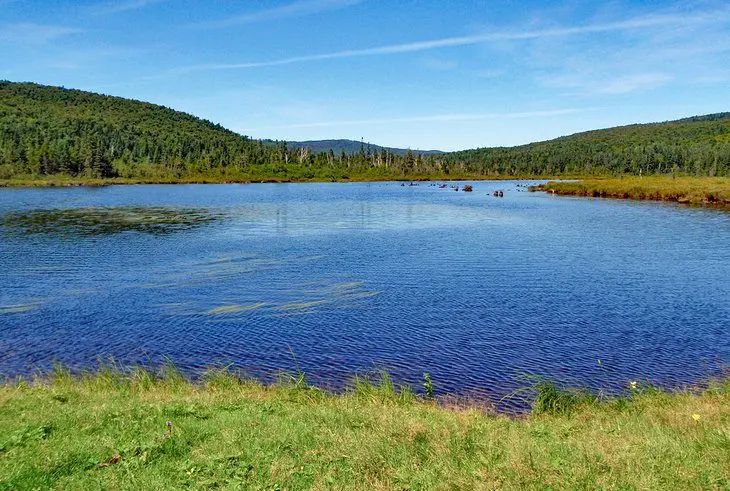
North of Lake Francis and, like it, connected by the Connecticut River (before it becomes the boundary between New Hampshire and Vermont) are the four Connecticut Lakes. All around them is a vast area of forests, ponds, and streams, with US Route 3 roughly following the river north to the Canadian border.
The road is commonly known as Moose Alley, for the frequent moose sightings along it. Signs caution drivers to watch out for them, as moose are unafraid of cars and can run into the road suddenly. First Connecticut Lake, the southernmost, is the largest at more than 3,000 acres, and the lakes descend in size as you drive north.
The only one you don’t see from the road is the Fourth Connecticut Lake, a tiny glacial pond less than two acres in size and surrounded by a forest of fir and birch. If you are intent on seeing it, there’s a trail from the border crossing. It’s hard to believe that the mighty Connecticut River begins in this pool.
There are no swimming beaches on these rock-strewn shores, but you’ll find put-ins for boats and canoes. The lakes are prime fishing waters, loved by wildlife watchers and those who relish being alone in the silence broken only by the occasional cry of a loon.










